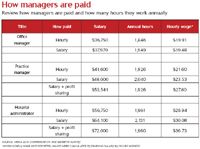The VHMA Files: Results from the 2013 Compensation and Benefits Survey
Get the inside scoop on veterinary practice managers' pay and benefits.
True confession: Managers love their jobs, but many are curious about how their salary and benefits compare to other practice managers. The VHMA's 2013 Compensation and Benefits Survey reveals which factors impact earnings.
The tough truth about salaries
Salaries generally reflect the strength of the economy. When the economy is robust, salaries tend to be higher. Because the economy is recovering slower than anticipated, the survey results reveal that the veterinary economy is struggling, and salaries reflect the struggle. Lower salaries are reported among managers and administrators in the industry, regardless of seniority and experience. Although office managers registered a 7% salary increase since 2011, the average practice manager's salary has plummeted by 6%, and hospital administrators' salaries have decreased by 4% during that same period.

How managers are paid
The news is not all discouraging. The results also reveal that there are opportunities for managers and administrators to increase their compensation. For example, the 2013 survey clearly shows that becoming a Certified Veterinary Practice Manager (CVPM) improves compensation. Managers with a CVPM earned $2,500 more each year and administrators earned $4,000 more per year. Post-graduate degrees also drove salaries higher. Employees who shared in the financial risk of a practice reported higher salaries; managers who received a profit share in addition to their salary received between $5,000 and $10,000 more than average.
The type of practice a manager is affiliated with can also impact compensation. Practice managers working in emergency practices earned the highest salaries but worked the longest hours. Of all hospital administrators who responded to the survey, the 4% who worked in specialty practices reported the highest average salary. Hospital administrators managing more than one hospital reported a 25% increase in salary. Small animal hospital administrators worked the fewest hours but, in general, earned the lowest salaries.
Seniority is a weak driver of salary. And, in many cases, salaries trended lower as seniority among managers and administrators increased.
The issue with benefits
Office managers received an average of two weeks paid vacation each year. And practice managers and administrators received an average of three weeks.
Hospital administrators received more comprehensive benefits; office managers were likely to receive the weakest benefits. Continuing education and veterinary product discounts are benefits enjoyed by all managers. Hospital administrators are most likely to receive health insurance. The median co-payment for health insurance among all managers runs between 78% and 90%.
General trends
Since the last VHMA survey in 2011, veterinary managers and administrators have experienced a decline in salaries. Traditionally, seniority and experience have resulted in higher salaries but the survey results indicated that these factors do not guarantee higher salaries. Managers committed to earning higher salaries would benefit from enrolling in certification or advanced degree programs or negotiating a profit sharing arrangement with their employer.
Visit dvm360.com/VHMA for an overview of job responsibilities by title for office managers, practice managers and hospital administrators in veterinary practice. You'll also find the 2013 Compensation and Benefits Survey methodology and more data that outlines how credentials change what you make.
Christine Shupe, CAE, is the executive director of the Veterinary Hospital Managers Association. The association is dedicated to serving professionals in veterinary management through education, certification and networking.